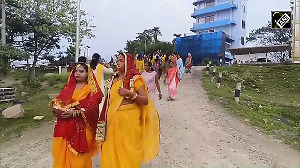In fact Carvajal, or Yogurt de Mora as he is known, is one of the most recognised names in Chilean tennis, where he became famous as a favourite ballboy and racquet stringer to the country's top players.
A combination of economic growth, which made television more available to the masses, and some of Chile's most talented players in years helped to propel Yogurt and the game itself into the living rooms of everyday Chileans.
Yogurt won the hearts of fans and players in 1986 when he apparently used ballboy antics to hold up a marathon Davis Cup match so that Chilean contender Hans Gildemeister could catch his breath between points and defeat Canada's Glenn Michibata.
Tennis is a sport for the elite in most Latin American countries but Chile has bucked that trend thanks to a strong economy at the same time as tennis racquets became cheaper and Chile's international calibre players attracted increasing local media attention.
The game has grown in popularity in this Andean nation in the past decade as the country entered an economic boom that allowed it to reduce its poverty rate from about 40 percent of the population in 1990 to less than 20 percent.
"Tennis is really taking off in Chile. After a major game you can see kids playing with their racquets in the streets," Yogurt de Mora told Reuters on the sidelines of tennis courts near Santiago's National Stadium.
Carvajal's nickname means "Blackberry Yoghurt", a reference to his dark skin. He regards it as a term of endearment and puts it on his business cards.
PUBLIC COURTS
These days, some 30 years after Yogurt took his first job as a ballboy to help his poor family pay the rent, Chile has two players -- Fernando Gonzalez and Nicolas Massu -- ranked in the world top 30, and the sport is enjoying a boom.
"Children want to play tennis," said Yogurt, who runs a tennis camp for under-privileged children.
Once, the sport was played behind the tall, groomed hedges that surrounded private clubs. Now, inexpensive tennis schools are on the rise and public courts are appearing.
At the competitive level, the number of ranked players has tripled in the past decade to more than 1,200,
In that same period, Chile has won three Olympic tennis medals and one of its players, Marcelo Rios, reached the number one world ranking.
Marco Antonio Cumsille, one of the country's best known sports commentators, says tennis got its biggest push in the late 1990s, when Rios ruled the courts.
"A lot of people, older people, women, followed Rios," said Cumsille, noting that the player's good looks and rebel image appealed to everyone.
TELEVISION RATINGS
When Rios, now on the world masters' circuit, played, television ratings soared to record levels.
"The big difference was technology and a young man named Marcelo Rios, who did great on the professional circuit, and the games were transmitted live in Chile, taking tennis into the homes of families who previously only had football," said Mario Pakozdi, president of the Chilean Tennis Federation.
Traffic slows when a Chilean plays in an international tournament as people pause to listen to stroke-by-stroke accounts of the game by popular sports commentators.
Families of promising young players are willing to spend to give their children a shot at the top, paying out for instructors, fitness coaches and sports psychologists.
"I love the sport. I love the competition. It's exquisite and it's even better when you win," said 19-year-old Andrea Ayala Santibanez, who plans to be a sports journalist so she can continue to follow tennis from the sidelines once she stops playing.
Her parents said they paid some $800 a month -- a huge amount for a middle-class Chilean family -- to keep Andrea and her brother Hugo, both ranked, in the game.
Gildemeister, who is now the coach for Chile's Davis Cup team, told Reuters some children and their parents were perhaps too impatient for success.
"Boys are thinking about being professionals but they are not thinking in terms of stages. To get anywhere in the tennis world, first you have to be number one in your country," he said.
(Additional reporting by Claudio Cerda)








 © 2025
© 2025